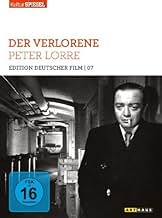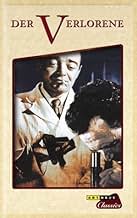Der Verlorene
- 1951
- 1 घं 38 मि
IMDb रेटिंग
7.0/10
1.2 हज़ार
आपकी रेटिंग
अपनी भाषा में प्लॉट जोड़ेंGerman scientist murders his fiancée during World War II when he learns that she has been selling the results of his secret research to the enemy.German scientist murders his fiancée during World War II when he learns that she has been selling the results of his secret research to the enemy.German scientist murders his fiancée during World War II when he learns that she has been selling the results of his secret research to the enemy.
- पुरस्कार
- 1 जीत और कुल 1 नामांकन
Helmuth Rudolph
- Colonel Winkler
- (as Helmut Rudolph)
Eva Ingeborg Scholz
- Ursula Weber
- (as Eva-Ingeborg Scholz)
Peter Ahrweiler
- Oberstleutnant Marquardt
- (बिना क्रेडिट के)
Josef Dahmen
- Lieske, canteen bartender
- (बिना क्रेडिट के)
Helmut Eichberg
- Oberstleutnant Bydersahn
- (बिना क्रेडिट के)
Kurt Fuß
- Baldheaded Man
- (बिना क्रेडिट के)
Joachim Hess
- Leutnant
- (बिना क्रेडिट के)
Richard Münch
- Criminal Inspector #1
- (बिना क्रेडिट के)
फ़ीचर्ड समीक्षाएं
10vferenz
Der Verlorene is an extraordinary film noir not only as text but also in its context. This film disappeared after only ten days from german screens although most critics said that it´s the best german film after WW II. The reasons are very simple: First, it was too late. This film five years earlier in 1946 would have been the Trümmerfilm par excellance. Compare it to Die Mörder sind unter uns and you will see the huge difference. Second, in the upcoming era of Wirtschaftswunder no one in whole Western Germany wanted a reminder on what their industry and morality was build on: the Third Reich. Consider this, when Marlene Dietrich came back to Germany many people shouted: Go home! In the 1950s one producer said about Fritz Kortner: Hitler could have burnt more Jews. This way of thinking wasn´t elimated and still it´s not. Nowadays WW II is good for action flics (Saving Private Ryan and all this crap) or love stories (for example this desaster Enemy at the Gates). It´s depressing but one shouldn´t get mad over it. Just see Der Verlorene and you will see there were people how to handle this topic in an adequate manner. Maybe there are some filmmakers out there who still know. Let´s hope for it.
After years of dreary labor in Hollywood as a professional "evil foreigner," Lorre went home to Germany to write, direct and star in this dark, dreamlike narrative in which he plays the ultimate Peter Lorre character: a Nazi mad doctor sex murderer. The film is an ironic commentary by Lorre, the reluctant impersonator of psychopaths, on the nature of true psychopathology as embodied in the amoral Nazi regime. It's also an ingenious melding of the sort of B-film noir that Lorre had specialized in for years as an actor (Maltese Falcon, Stranger on the Third Floor, Quicksand) and the impressionistic Nouvelle Roman/Nouvelle Vague influenced art film just picking up steam on the continent (shades of Orpheus, Wild Strawberries, and Last Year at Marienbad can be seen in its shadowy enfolding of past/present and dream/reality.) Though somewhat uncertain in balancing himself between his roles as principal actor and director (the motivations of some of the other characters are somewhat murky, for instance, and it's rather a shock to see Peter Lorre so continually being the object of women's lustful attentions) this was clearly a man with the makings of an ingenious and original filmmaker. It's a shame this film isn't better known, and that Lorre never got the chance to make another.
This is probably a good movie, but it's hard to tell because at many key moments throughout the movie it is difficult to read the subtitles. Because the movie is in black and white, white subtitles keep showing up on white background and so, unless you understand German, you only catch snatches of important conversations. This is particularly a problem in the last fifth of the movie that involves a scene in a large house where a plot to kill Hitler is being hatched (I think). What that had to do with Dr. Rothe (the Peter Lorre character) killing his fiancee and his subsequent choice about which Nazi to shoot I have yet to figure out. After the movie, I asked total strangers in the audience what was going on in that house and they didn't know either.
I suggest that any distributor who is looking to make some money from this movie should consider producing a new edition with yellow subtitles that will stand out on both black and white backgrounds. Without those, this will remain a movie that is well-known only in Germany.
I suggest that any distributor who is looking to make some money from this movie should consider producing a new edition with yellow subtitles that will stand out on both black and white backgrounds. Without those, this will remain a movie that is well-known only in Germany.
Following a period of rehabilitation where he managed to beat his addiction to morphine, character actor extraordinaire Peter Lorre felt confident enough not only to leave his secure employment as a lean, sleek villain in myriad Hollywood noirs and go back to his native Germany after almost 20 years (which, like many compatriots, he had fled when the Nazis came to power) but also to embark on his sole foray behind the camera. Adopting an unfussy technique but a compelling flashback structure, Lorre turned out a truly remarkable piece of work that, equally unsuccessful on its first release as Charles Laughton's THE NIGHT OF THE HUNTER (1955) and Marlon Brando's ONE-EYED JACKS (1961), has yet to have its somewhat maligned reputation vindicated in the same unequivocal manner as these two 'one-hit wonders' by actors-turned-directors. A chubbier, infinitely world-weary Lorre gives a haunting central performance as the dedicated, real-life scientist Dr. Karl Rothe who, being told by his superiors that his discoveries were being passed on to the allied forces by his beautiful (and much younger) fiancée, strangles her in a moment of silent rage upon returning to the lodgings he shares with his mother-on-law and her cat; the actress playing Lorre's first victim (Renate Mannhardt) makes such an indelible impression on the spectator that, upon a second viewing, one is surprised to discover how brief her appearance in the film actually is. Changing his identity and now serving as a medical doctor in a refugee camp, Lorre is brought once again face to face with his inner demons in the shape of his assistant during WWII who, apart from having carried on an affair with Lorre's wife, was secretly also an important Party official investigating the infamous "Night Of The Long Knives" conspiracy (which is rather murkily dealt with in the film's latter stages); another enigmatic aspect of Lorre's personality that is somewhat oddly thrown into the mix is his troubled dealings with other women over the years, culminating in another murder committed in a stationary train carriage. Interestingly, the film opens with a shot of a moving train out of which emerges the tiny figure of Lorre walking towards the refugee camp and ends in a devastating medium shot of Lorre, one hand clasped dejectedly to his face, standing stationary on the railroad tracks as a locomotive rushes headlong in his direction! As one can surmise from this synopsis, THE LOST ONE's lack of critical and commercial success ought to be attributed more to its utter grimness and thoroughly defeatist view of post-war Germany than to any jinx the production might have been vested with (the film's producer, Arnold Pressburger, died in mid-production, the original negative was lost in an editing suite fire and the film survives via a reconstructed print, etc.) and, indeed, should be much better known even among film connoisseurs. Personally, I had first come across a copy of the film at a priceless DVD rental store on Santa Monica Blvd. in Hollywood in January 2006 but I have since added it to my collection in a seemingly restored version (albeit sporting distractingly ungrammatical English subtitles).
DER VERLORENE is one of these films that at first seemed to me very confusing and brought me the sensation "i am not following...".I rated it 8 out of 10 mainly because of the wonderful film-noir atmosphere,the black and white photograph,the very well filmed scenes on the streets of "old" Hamburg and ,above all,the extraordinary last minutes.
Then,time passed and months later ,i still have that strange feeling in my mind ,i have been dreaming with that loneness and absurd madness of the main character-the doctor played by Peter Lorre.So i decided to include DER VERLORENE amongst my personal list of best films ever and change my vote to 10 out of 10.
Sometimes a good work of art takes its necessary time to mature as a good wine!.In my humble opinion that is the case of this film.
Then,time passed and months later ,i still have that strange feeling in my mind ,i have been dreaming with that loneness and absurd madness of the main character-the doctor played by Peter Lorre.So i decided to include DER VERLORENE amongst my personal list of best films ever and change my vote to 10 out of 10.
Sometimes a good work of art takes its necessary time to mature as a good wine!.In my humble opinion that is the case of this film.
क्या आपको पता है
- ट्रिवियाPeter Lorre's only film as director
- क्रेज़ी क्रेडिटExplanatory caption (in German) in opening credits: This film is not a work of fiction. The events are based on factual reports from the last few years.
- इसके अलावा अन्य वर्जनThere is an Italian edition of this film on DVD, distributed by DNA srl, "UN UOMO PERDUTO (1951) + CRIME AND PUNISHMENT (Ho ucciso!, 1935)" (2 Films on a single DVD), re-edited with the contribution of film historian Riccardo Cusin. This version is also available for streaming on some platforms.
- कनेक्शनFeatured in Displaced Person - Peter Lorre und sein Film 'Der Verlorene' (2007)
टॉप पसंद
रेटिंग देने के लिए साइन-इन करें और वैयक्तिकृत सुझावों के लिए वॉचलिस्ट करें
विवरण
- चलने की अवधि1 घंटा 38 मिनट
- रंग
- ध्वनि मिश्रण
- पक्ष अनुपात
- 1.37 : 1
इस पेज में योगदान दें
किसी बदलाव का सुझाव दें या अनुपलब्ध कॉन्टेंट जोड़ें





























